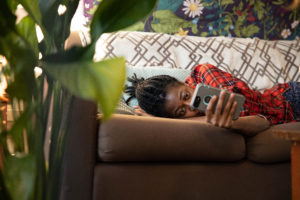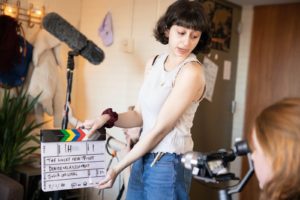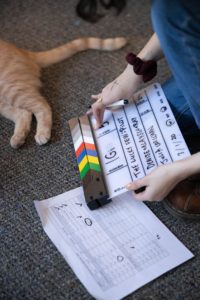Freshman acting majors Alaysia Duncan and Denise Kolodja, and sophomore TVR major Ray Deutsch talk about their first episode of their web series, “The Lucky Few.” All three women touch on production struggles, their insights, motivation and what to expect next in terms of content.
Julia Batista: So, how did the story plot of the lucky few come about?
Alaysia Duncan: So, back over winter break, Denise and I wanted to write something. Our initial idea was like, okay, well we’re two girls in college. So we might as well write about two girls or in college. And so when we came back from winter break, we had a first draft of the script, but it was like 40 pages long, which is a lot longer than what a web series usually is so we had to do a lot of re-cutting and reframing it, but we wanted to kind of keep the same idea of this dramedy about two best friends in college. So yeah, it’s been through a lot of changes in terms of, length and tone, but the original idea has stayed consistent, I think.
Denise Kolodja: We didn’t necessarily cut. We talked to Ray about cutting it and then we all decided that we should just rewrite episodes, and kind of rebrand the web series. The way that we had originally written it in 48 pages, it was sort of like we were writing it as if it were a pilot you would probably see on like, an ABC show or something but then we realized that to actually get an audience, we might want to make it shorter. And they helped us do that and helped us get around those lines, and keep the same idea. 
JB: Okay, so just like to clarify, Ray, can you kind of explain what your role in this is?
Ray Deutsch: I met Denise back in November when I was assistant producing a film and I believe Denise talked to the initial producer saying that she and her friend Alaysia had an idea for a script that they wanted to write. Michaela Willner kind of hooked me and Denise up and we started talking, I read their script, it was beautiful, but I’m looking at kind of what we’re able to do as student filmmakers. I kind of helped them bring it to a more concise place and kind of turn their initial script into something that we could feasibly make as young filmmakers and as young students. It was a really cool process, it was a lot of reading and writing and rewriting and sharing notes… I think it really goes into these two characters who they just really wanted to portray each other and so they kind of wanted to be able to make something and I was like, okay, we can do that but let’s make something that we could actually make.
JB: So can you tell me a little bit more about the background of Hypochondriac Productions?
RD: That’s just a fetus production company that I’m starting because I wanted to be able to brand the content that I’m making. I really want to focus on being able to show women characters, show characters like you two are gorgeous black women of color. Like that’s really cool. We don’t see a lot of that on TV. I wanted to be able to make stuff that a lot of other people can see themselves in. I don’t know, I really care about feminism and change and making the world a better place. And I want to be able to do that through my media, mental health specifically is what a lot of the things that I write kind of correspond with. So Hypochondriac kind of comes from me and my own journey with mental health and figuring out like, my own anxieties.
DK: It’s Ray’s fetus production company and she’s helping us and now we’re sort of a part of it, but it’s all hers.
JB: So then what are you hoping “The Lucky Few” to turn out to be or to see come out of it, I guess you’d say?
AD: A lot! Well, so originally, why we wanted to do a web series in the first place was because obviously there are a lot of Park films that happen throughout the year, but sometimes it’s really hard for theater students to get to do that. One, because we had to get permission from our faculty and two, because of scheduling stuff that often gets really hard. And so there’s a lot of camera acting work we don’t really get a lot of experience in. So we really wanted to use the free time that we had to learn more about what it’s like to act on camera, as well as to start getting footage for our acting reels so that by the end of our four years of college, we have something tangible to show casting directors and all that stuff.
DK: It was a lot about making something for ourselves and making something that we can act in, because sometimes, like she said, we can only do theater productions or be unable to do Park films because of our schedules and because of our permission forms, our teachers might not let us because we’re in a show currently. But we felt that we wanted and needed on-camera experience right now as a freshman, because I actually talked to some of the seniors about it, and they said that they all thought about doing their own work or making a web series, but they didn’t start until their junior/senior year. We wanted to start this year so that we can grow by the time we’re seniors so that we can have stuff or a reel and we even have roles that we can include our friends in. And also it’s just kind of, fun to write it, to be a part of it, to act in, to do the whole movie set, it’s just a lot of fun to create something that matters.
RD: Like, for me, it’s mostly about telling the story about female friendship. Like you guys probably agree. I think our biggest inspiration was “Broad City.”
AD: Oh yeah.
RD: So I don’t know, I think that’s a huge part of it. And being able to get our names out there, or even just in our small sector of Ithaca. One of my favorite parts about being a producer is creating opportunities for other people, like reaching out to people who I know are good at audio or people who are good cinematographers and directors of photography, who just haven’t pursued that, or people who make music. I think it’s like a really cool opportunity to make something that other students can collaborate on and create a basis for actors too.
JB: So what is the story of Maliya and Sarah supposed to develop into? Without spoilers, tell me anything that’s not confidential.
RD: It’s about college and finding yourself and finding your people. And I think it’s about finding that your soulmate doesn’t have to be romantic.
DK: We sort of outlined some of the future episodes that we would have done if we stayed on campus and a lot of those future episodes had other people in them and other characters, too. We were sort of going to make our friend group and they were each going to come in a new episode and become a part of our group and become a part of our story. The main story was between Sarah and Maliya, but we just never got a chance to do that.
AD: So we were supposed to film five more episodes before the semester had ended. Like we had auditions and everything. We were going to explore Maliya’s and Sarah’s love lives, we were going to explore that friend group Denise was talking about, the majors that they’re in and yeah, there’s not necessarily really like a full kind of super, super structured plot. It’s more about like, a slice of life like these two girls, and the people around them and like, how they’re growing with each other and separate from each other.
JB: So how would you say that your web series is different or unique compared to streaming, shows today, like other shows that exist today?
DK: Oh, first of all, our budget is very different.
AD: Yeah, and I also think in terms of comparing it to other streaming sites, I definitely think that racial representation is getting a lot better, especially with shows like “Never Have I Ever” that just came out. Black representation specifically is getting a lot better. But I still think something that’s missing from that are shows about black people where race isn’t necessarily like, the center point of it, where it’s just kind of like, these are characters that happen to be black and this is their story. I think the fact that we’re just like two girls in college who happen to be black. And we kind of just have, or at least we would have gotten to show these every day simple events like your first kiss and going to your first party. As black women, it’s very important to me.
RD: For me, it was really important to make sure that this project was focused on having women behind the camera. Like our director of photography, our assistant director, myself, we’re all women of Park. It’s no secret that film is a boys club. So I guess that was kind of a big push for me too, and being able to make my own productions.
JB: So then, what would you say is the central big idea that you’re trying to push through the web series? Once it’s done, what do you want people to get out of it?
DK: I mean, with time, maybe we would have found one, but the way that we’ve been doing it, it’s just to show that it’s fun and normal. It’s about two normal girls and the fact that women are a part of the production. The fact that we have two black female leads, we just want it to be a normal show that has those things because you don’t normally see those things in shows that are big right now. You don’t see an all-female cast, you don’t see female writers and directors behind those shows you don’t see two colored leads. Two, most specifically, dark-skinned female leads. You don’t usually see that. The first time I really saw that was in “How to Get Away with Murder” with Viola Davis in a TV show and “Scandal.” Those were the first times that I saw that. Alaysia and I got excited about the idea of being able to do that for ourselves and just have it be a normal thing. Because like Viola Davis said, “Dark-skinned black women can be sexy and they can be leads.”
AD: I would also add that I think if there were going to be something that people are going to get out of this is that friendships, your relationships, especially in college, can really carry through anything. And that’s something that I’m definitely learning like in my freshman year, and especially being in quarantine in this weird time. It’s really the relationships that you build that kind of influence the world around you and how you kind of go about life and that kind of thing. So yeah, friendship I think is the thing that holds the show together, it’s the friendship between Maliya and Sarah.
RD: I agree. I mean, since I read your script, the things that stood out to me were strong women, strong friendships. I think we’re lucky that we were even able to carry that out into how the pilot at least turned out and I don’t want to give too much away about what we thought the finale would be.
JB: I heard that the pilot is kind of like your instrument to maybe rack up some revenue to cover production costs and equipment. Can you tell me a little bit more about that?
RD: Yeah, so we started a GoFundMe page. On set, I realized how hard everyone was working because as we are like student filmmakers, we don’t really get a lot of resources. I wanted to bring in some revenue so we could be able to feed the cast and crew on set and really spend the whole day on set and be able to make something, instead of making something 27 times. But yeah, I think it would be easier to be able to produce if we had funding for props and funding for costumes because we don’t really specifically have that through anything else.
JB: Since we’ve been in quarantine, how has that impacted production? How have you in the meantime generated other ideas or inspiration? How have you not let momentum get lost?
AD: I think having the episode just come out helped motivate me a little more than I had been, and seeing the responses from people. But yeah, what we’re trying to figure out right now is how can we do a web series remotely. How can we show these characters in a way that is still true and honest and entertaining, but through this sort of medium? So we’re still gonna toss around ideas about that. But right now, we are interested in kind of making like a pocket series of “The Lucky Few.” It wouldn’t necessarily follow the original kind of stories that we had and the production we were going to do because we want to save those when we actually have a full production crew. But something short and really fun, more on the comedic side probably episodes that we can do over the summer is what we’re looking to do. So yeah. Hopefully, there’ll be more news about that once we kind of figure it out. It’ll be interesting to see what we can do because it’s definitely an interesting medium to act in.
RD: Like, FaceTime and Zoom calls are a way that a lot of people are still making content, like “Parks and Rec” released a Zoom episode. A lot of people are doing it like that and that could also be a good way to show these two characters as best friends who are separated during quarantine. I don’t know if we’re going to do it in the context of that or just separated and would call each other and FaceTime each other and talk to each other.
(This interview has been edited for clarity.)
Photos taken by Chloe Gibson.

